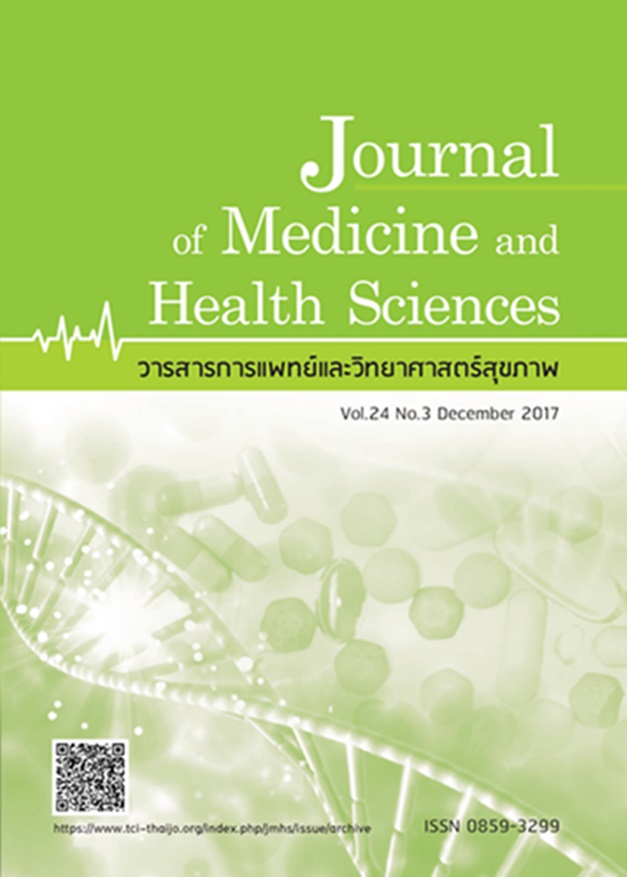การใช้โปรแกรมการรับรู้ความสามารถของตนเองด้วยเทคนิค 351 พิชิตภัยอ้วนของบุคลากร ที่มีภาวะน้ำหนักเกินและภาวะอ้วนในโรงพยาบาลกาฬสินธุ์ อำเภอเมือง จังหวัดกาฬสินธุ์
Keywords:
การรับรู้ความสามารถของตนเอง เทคนิค 351 น้ำหนักเกิน, /self-efficacy behavior, 351 technics, overweightAbstract
การวิจัยนี้เป็นการวิจัยแบบกึ่งทดลอง มีวัตถุประสงค์เพื่อศึกษาผลของการใช้โปรแกรมการรับรู้ความสามารถของตนเองด้วยเทคนิค 351 พิชิตภัยอ้วน ที่มีต่อการรับรู้ความสามารถของตนเอง พฤติกรรมการบริโภคอาหาร การออกกำลังกายและค่าดัชนีมวลกายของบุคลากรที่มีภาวะน้ำหนักเกินและภาวะอ้วนในโรงพยาบาลกาฬสินธุ์ กลุ่มตัวอย่าง ได้แก่ บุคลากรโรงพยาบาลกาฬสินธุ์ที่มีภาวะน้ำหนักเกินและภาวะอ้วน มีค่าดัชนีมวลกายมากกว่า 23 กิโลกรัม/ตารางเมตร จำนวน 32 คน ไม่มีโรคประจำตัวจากการมีภาวะน้ำหนักเกินและภาวะอ้วน มีความสมัครใจเข้าร่วมโปรแกรมเพื่อลดน้ำหนักเป็นเวลา 14 สัปดาห์ เครื่องมือที่ใช้ในงานวิจัย ได้แก่ แบบสอบถามด้านการรับรู้ความสามารถของตนเอง พฤติกรรมด้านการบริโภคอาหาร และพฤติกรรมการออกกำลังกาย วิเคราะห์ข้อมูลด้วยสถิติร้อยละ ค่าเฉลี่ย ส่วนเบี่ยงเบนมาตรฐาน และ Paired t-test ผลการวิจัยพบว่า ภายหลังการทดลอง กลุ่มทดลองมีการเปลี่ยนแปลงด้านการรับรู้ความสามารถของตนเอง พฤติกรรมด้านการบริโภคและพฤติกรรมด้านการออกกำลังกายของบุคลากรที่มีภาวะน้ำหนักเกินและภาวะอ้วนสูงกว่าก่อนการทดลอง ส่งผลให้กลุ่มทดลองมีการปรับเปลี่ยนพฤติกรรมด้านการบริโภคและพฤติกรรมด้านการออกกำลังกายเพิ่มขึ้น มีน้ำหนักและค่าดัชนีมวลกายลดลงกว่าก่อนการทดลอง แสดงให้เห็นว่าการประยุกต์ใช้โปรแกรมการรับรู้ความสามารถของตนเองด้วยเทคนิค 351 พิชิตภัยอ้วน ประกอบด้วย 3 อ ได้แก่ อาหาร อารมณ์และออกกำลังกาย 5 วันต่อสัปดาห์ 1 ชั่วโมงต่อวัน ร่วมกับกระบวนการกลุ่มสามารถลดน้ำหนักในบุคลากรที่มีภาวะอ้วนได้
The purpose of this quasi-experimental study was to apply the Self-efficacy Program with 351 techniques to analyze and combat the risk of obesity, and to change behavior in dietary habits and exercise in overweight and obese patients at Kalasin hospital. The samples consisted of 32 overweight and obese health staff in Kalasin hospital, with a body mass index over 23 kg/m2, the volunteers entered a programme to lose weight for 14 weeks. Instruments used for the health behavior program consisted of 351 techniques for losing weight, and questionnaires on self-efficacy, dietary behavior, exercise behavior and body mass index. Data was analyzed by using percentage, means, standard deviation, paired t-test. After the experiment, the experimental group had changed their behaviors in self-efficacy and dietary habits to a higher level than those before the experiment. Results in the experimental group have modified their dietary habits and exercise behavior, their body weight and body mass index was lower than those before the experiment. The research results show that the application of a self-efficacy program with 351 techniques for losing body weight for overweight and obese
including a 3 process plan of diet and exercise 5 days a week for 1 hour a day and the group
process can reduce body weight in staff that are obese
References
Clinical practice guidelines for the
prevention and treatment of obesity in
children; 2014.
2. Institute for population and social
research Mahidol University. Health
Thailand 2014. 1rd ed. Nakhon Pathom:
Institute for population and social
research, Mahidol University; 2014.
3. Department of Occupational Medicine.
The annual health checks personnel.
Kalasin: Department of Occupational
Medicine; 2015.
4. Vaayeeta R. Effectiveness of changing
health behavior program on self efficacy,
self-regulation, self-care and weight loss
among overweight Health Personal
of Raman Hospital, Yala province
[dissertation]. Yala : Yala Rajabhat
University; 2013.
5. Na Chiangmai E. Effects of group process
on knowledge, attitude, and behaviors
of Care-Givers of type 2 diabetes elders
at Huay Han primary care unit, Lamphun
Province [dissertation]. Chiangmai :
Chiangmai University; 2009.
6. Pholchai S. Effects of a weight
loss program on perceived selfefficacy for weight loss, weight loss
behaviors, body mass index, and waist
circumference among pre-menopause
obesity women, Nakhum subdistrict,
khum Khuean Kaeo district, Yasothon
province. [Dissertation]. Maha Sarakham:
Mahasarakham University; 2012.
7. Bureau of Nutrition Department of
health, Ministry of public health. Guide
to obesity. 5rd ed. Nonthaburi: The war
veterans organization of Thailand under
Royal Patronage of His Majesty the King;
2009.
8. Lohakul K. The Effectiveness of the
modifying health behavior program
on the overweight personnel of the
Takuapa hospital [dissertation]. Phuket :
Phuket Rajabhat University; 2011.
9. Yaemmen P. The effects of health
promotion program by application of
Health belief model and social support
on behavioral modification for weight
control among overweight students at
level 5 of primary school, Muang District,
Phitsanulok Province [dissertation]. Khon
Kaen : Khon Kaen University; 2011.
10. Charoensittichai P. An application of
health belief model, group process
and social support to promote weight
control among overweight children in
primary schools, Maung Chachoengsao
municipality [dissertation]. Chon Buri :
Burapa university; 2005.



